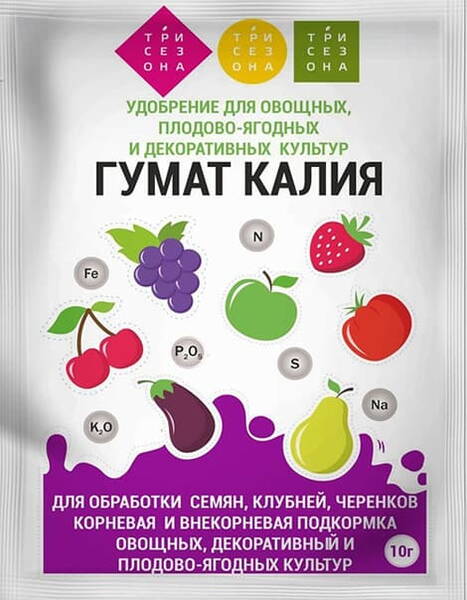Active ingredient: Potassium salts of humic acids.
Has the following properties:
* Increases germination energy and seed germination.
* Stimulates the growth and development of plants.
* Protects plants from adverse factors, frost, drought and increases the survival rate of plants when transplanting seedlings.
* Reduces the nitrate content in fruits, neutralizes radionuclides and heavy metal salts.
* Increases productivity by 30-40%, increasing the content of vitamins and other nutrients in vegetables, berries and fruits.
* Accelerates ripening by 7-10 days.
Directions for use for all types of plants:
* soaking seeds, tubers or cuttings - 0.5-1.0 g per 10 liters of water.
* root feeding - 1.5-2.0 g / 10 l.
* foliar feeding (spraying) - 1.5-2.0 g / 10 l (3-4 times per season)
Timing of treatments according to plant development phases: before and after flowering, at the beginning of ovary formation, in the phase of intensive fruit growth.
The guaranteed shelf life is unlimited.
Potassium humate is a highly effective and technologically advanced humic fertilizer enriched with important microelements. Growth stimulant and anti-stress agent.
Potassium humate has a wide range of effects on plants. Its properties are manifested in almost all agricultural crops.
The use of potassium humate in agriculture allows:
Increase yield (depending on the crop) by 10-25%;
Improve the quality of agricultural products (gluten, sugar content, vitamin C in vegetables);
Strengthen the immunity of plants;
Increase frost and drought resistance by increasing the root system of plants;
Increase the efficiency of processing seed material together with disinfectants (field germination of seeds increases, suppression of pathogens increases, plant immunity increases);
Relieve stress in plants by increasing the effectiveness of foliar treatments with pesticides and complex mixtures (stimulates growth and development, relieves stress during complex treatments, stimulates the process of photosynthesis);
Increase the efficiency of the use of mineral fertilizers (the utilization rate of nitrogen, phosphorus, and potassium increases).
Crops that respond particularly well to the addition of potassium humate:
* all nightshades (potatoes, tomatoes, eggplants, etc.)
* table and fodder beets
* all grain crops show a significant increase in yield.
Crops that react poorly to potassium humate:
* Legumes do not change the indicators in any way (for legumes it is better to use ammonium molybdate).
* Sunflower and pumpkin do not react to potassium humate; its use is inappropriate.
If the year was bad or you planted them on low-quality soils, then the use of potassium humate can work a real miracle!
Potassium humate is highly effective on alkaline and neutral soils, but ineffective on acidic soils.
It is also not recommended to use Potassium Humate on fertile soils (chernozem).















